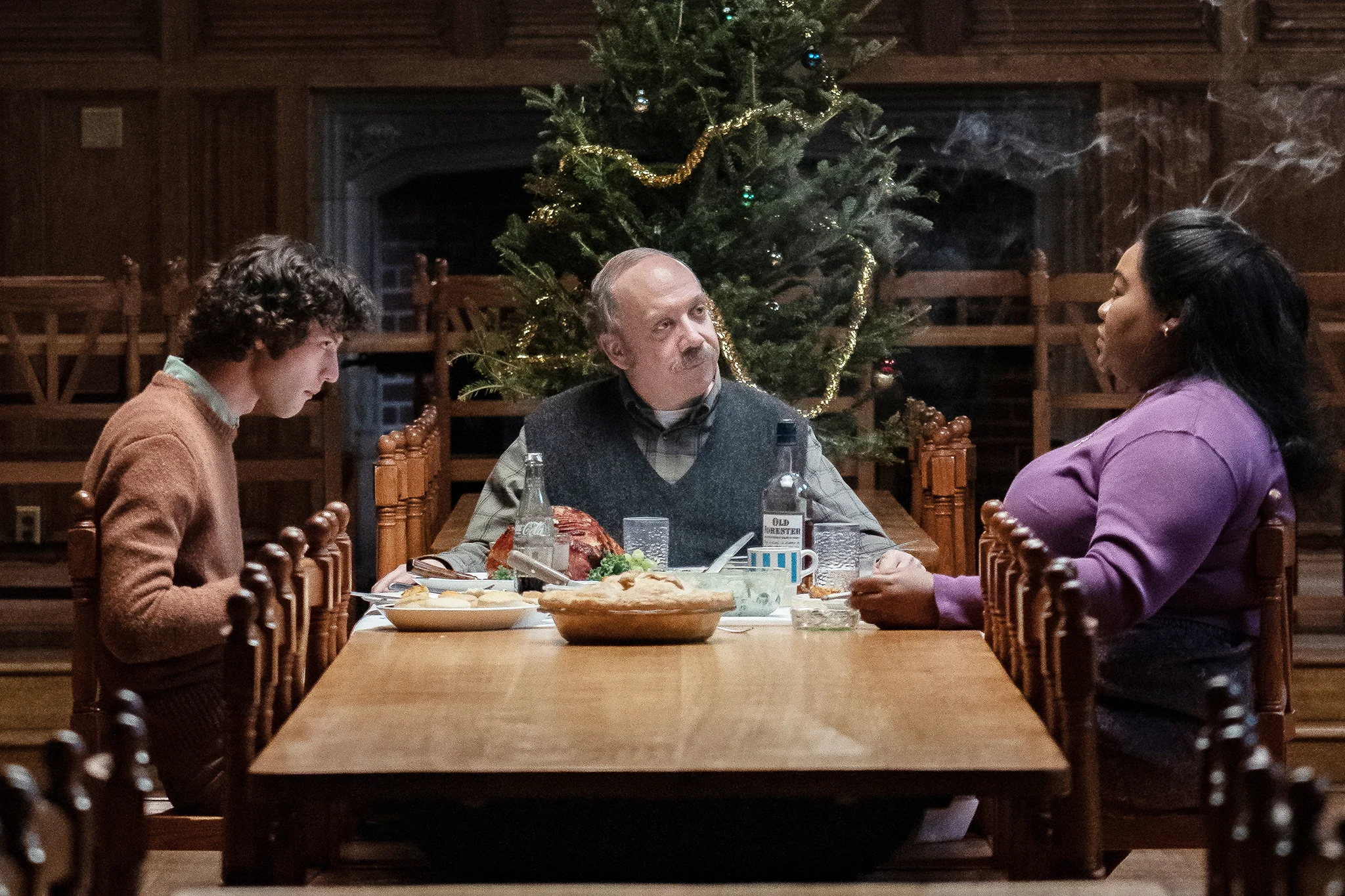Analysing The Holdovers (2023) through the lens of Gilles Deleuze and Félix Guattari’s Anti-Oedipus offers a fascinating excavation into the film’s thematic and character complexities. This film, directed by Alexander Payne, encapsulates the essence of disappointment and disillusionment within its character-driven narrative, mirroring the Deleuzo-Guattarian concept of desiring-machines and the critique of traditional psychoanalytic structures.
Exploring The Holdovers: A Brief Summary
Set against the backdrop of a prestigious academy in New England during the winter break of the early 1970s, The Holdovers unfolds the narratives of three distinct characters: Paul Hunham (Paul Giamatti), an irritable and reclusive educator with a harsh exterior; Angus (Dominic Sessa), a quick-thinking and somewhat confrontational pupil struggling with the loss of a loved one; and Mary (Da’Vine Joy Randolph), the institution’s chief cook grieving over her son’s death in Vietnam. As the holiday season casts a deserted silence over the academy, these individuals, each facing their own battles of sorrow and disenchantment, unexpectedly come together.

Amidst their initial reluctance and contrasting personalities, they find in each other a makeshift family, challenging their initial assumptions about support and companionship. Celebrated for its compelling performances and a nostalgic nod to the quintessential American films of the 1970s, the film delves into the themes of serendipitous connections, self-discovery, and enduring human resilience amidst trials.
Introduction to Deleuzian Concepts in Cinema
In Gilles Deleuze and Félix Guattari’s Anti-Oedipus: Capitalism and Schizophrenia (1972), several key concepts reshape our understanding of human desires and societal structures. Central to their theory is the idea of desiring-machines – entities that produce and disrupt, reflecting an endless process of desire creation and satisfaction. Rhizomatic structures refer to non-hierarchical networks that allow for multiple, non-linear connections, akin to the root system of a plant. Multiplicity and becoming encapsulate the notion of identities being fluid and composed of many dimensions, rather than fixed entities. Deterritorialization describes the process of moving away from a rigid structure or role, enabling new ways of being to emerge (for more information on these concepts see also: Deleuze and Guattari 1987; Deleuze 1988, Deleuze 1994, Deleuze 1995). These concepts offer a fresh approach to The Holdovers.
Characters as Desiring-Machines

In The Holdovers Paul Hunham , Angus and Mary can be understood as desiring-machines – each disrupting and being disrupted by their environments in a continuous flow of desires and resistances. Paul’s role as a difficult educator, for instance, isn’t simply about his personality; it reflects a broader disruption of traditional academic and social flows. His literary fortress and sharp wit serve as mechanisms for redirecting these flows, asserting his identity outside the conventional teacher-student relationship. Similarly, Angus’s sarcasm and Mary’s nightly rituals are personal strategies for coping with loss and disappointment, marking their individual paths of deterritorialization within the school’s structure.
The Setting as a Space of Deterritorialization
The nearly deserted New England academy during the winter holiday provides a stark backdrop for the unfolding drama, acting as a space where normal societal and familial structures are momentarily set aside. This setting facilitates the formation of a temporary community among Paul, Angus, and Mary, illustrating the rhizomatic nature of human relationships. Unlike traditional family ties, their connection is based on shared experiences of loss and displacement, forming a network of support that defies hierarchical categorizations.
Reflections on Disappointment and Resilience

Disappointment serves as a crucial driving force in the film, shaping the characters’ interactions and self-perceptions. However, through their shared experiences, Paul, Angus, and Mary each undergo a process of becoming, moving beyond their initial conditions of despair. This evolution reflects the Deleuzo-Guattarian notion of multiplicity – the idea that identities are not fixed but are instead composed of various intersecting lines of experience and desire. The film’s nuanced portrayal of these characters’ shifts away from their predetermined roles highlights the potential for transformation inherent in every act of deterritorialization.
Embracing the Aesthetic of the 1970s
The Holdovers not only delves into the personal landscapes of its characters but also encapsulates the spirit of the 1970s, an era marked by questioning and change. By situating the narrative in this transformative period, Payne aligns the personal deterritorializations of Paul, Angus, and Mary with broader societal shifts. The film’s homage to the aesthetics and sensibilities of 1970s American cinema further enriches its exploration of desiring-machines and rhizomatic connections, offering a layered understanding of the characters’ journeys towards self-realization and mutual recognition.
Through this Deleuzo-Guattarian analysis, The Holdovers emerges as a complex exploration of human desire, loss, and the potential for reinvention. Payne’s film, anchored by the performances of Paul Giamatti, Dominic Sessa, and Da’Vine Joy Randolph, transcends its narrative to probe the depths of human connection and the ever-changing nature of identity.
Bibliography:
Deleuze, G. (1994). Difference and Repetition. New York: Columbia University Press.
Deleuze, G. (1988). Spinoza: Practical Philosophy. San Francisco: City Lights Books.
Deleuze, G. (1995). Negotiations. New York: Columbia University Press.
Deleuze, G., & Guattari, F. (1972). Anti-Oedipus: Capitalism and Schizophrenia. Minneapolis: University of Minnesota Press.
Deleuze, G., & Guattari, F. (1987). A Thousand Plateaus: Capitalism and Schizophrenia. Minneapolis: University of Minnesota Press.

